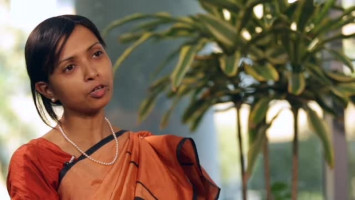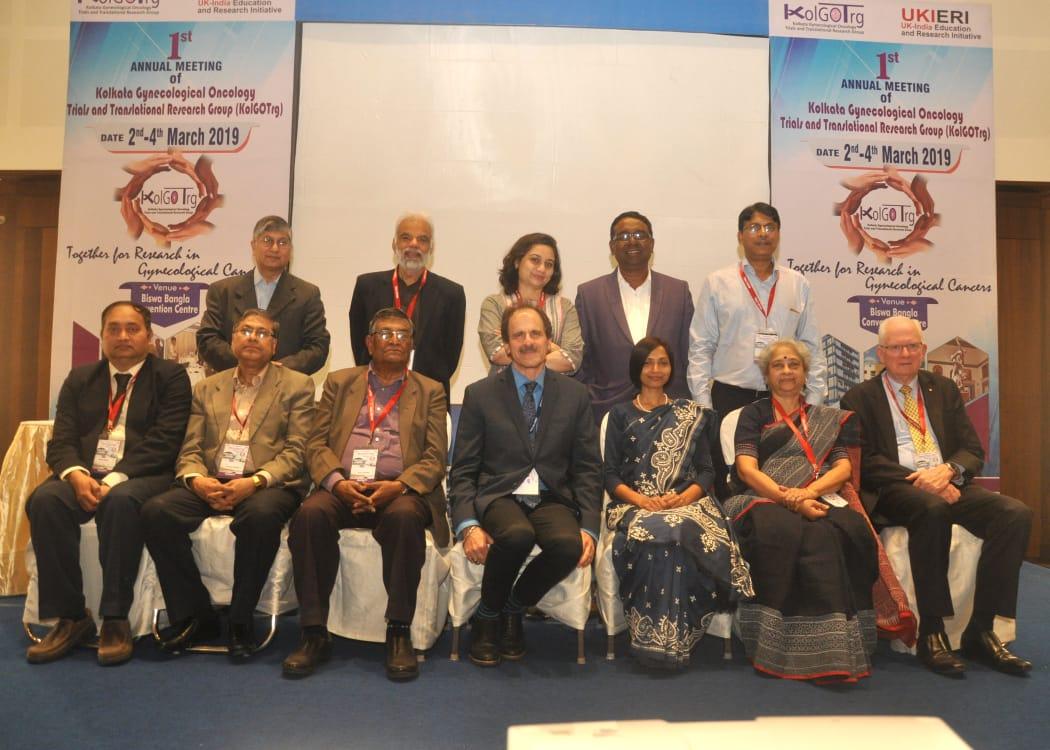Scientist Donates Rs 1 Crore in Royalty Fees For Women’s Cancer Research in India
Dr Asima Mukhopadhyay is a clinical scientist and one of India's leading voices in women's cancer research. She is the co-developer of the PARP inhibitor Rucaparib, an anti-cancer drug, and has done groundbreaking research in the field of ovarian cancer.

In 1998, when Dr Asima Mukhopadhyay, a UK-born clinical scientist, was 24 years old, she lost her father due to cancer. This, she says, pushed her to begin working in cancer research and development. For the last 20 years or so, she has dedicated her life to the field of obstetrics, gynaecology, and as a scientist in women’s cancer research.
Dr Asima moved back to India when she was around seven years old, and completed her education in Kolkata. In 2004, after attaining her medical degrees, she went back to the UK to become a specialist in gynaecology. At the time, there was no specialist training available in India. She obtained her Masters’ degree from the London School of Hygiene and Tropical Medicine in clinical trials. She returned to India in 2016, and today works between the UK and the Chittaranjan National Cancer Institute in Kolkata.
‘Lack of quality care for the poor’
“I remain mindful of the fact that my entire education in India has been free — because I studied in government schools and AIIMS. I know how much education costs in countries like the UK, so I’m grateful for the education I could receive here,” Dr Asima (47), tells The Better India.
“One of the main factors that led me to move to the UK was a lack of training in women’s cancer and surgery, which has since improved enormously,” she says, and adds, “But there still exists a tremendous amount of health inequality in the country. There’s a lack of legislation which also sometimes leads to unscrupulous practices. I work in a government set up, and I’ve noticed that the services are inadequate when it comes to healthcare access for low-income groups. It’s as if it’s granted that we have to treat poor people more poorly. There is a lack of integration of science, knowledge, and legislation, which impedes the delivery of quality care to those hit by poverty.”
Another experience that stood out when she visited the UK was the scientific and medical community’s emphasis on understanding, in-depth, the science and the subject before holding a knife and performing an oncological surgery.
Her return to India also familiarised her with the disintegration between clinicians and scientists. She found that surgeons had a mindset of sticking to the status quo and not moving in tandem with science progression.
Across low-middle income countries
This led her to develop a series of translational studies, called the PROject OVarian Translational (PROVAT). Provat was also Dr Asima’s father’s name. She also set up the Kolkata Gynecological Oncology Trials and Translational Research Group (KolGo Trg), which is the only group from India and the entirety of South Asia to represent the region in the Gynecological Cancer Intergroup.

“We are the flag bearers of the nation in clinical trials and science in the field of women’s cancer. It’s a matter of great pride,” Dr Asima says. The team consists of both physicians and scientists who are aiming to improve healthcare facilities in low-middle income countries, both research-wise, as well as treatment-wise.
Dr Asima was also the co-developer of an anti-cancer drug called PARP inhibitor Rucaparib, which is used extensively in the US for several cancer treatments.
Amazingly, in May 2020, she donated her share of the royalty money the drug generated to further research in women’s cancer in India to KolGo Trg. The amount, approximately around Rs 1 crore, was donated towards research capacity building and facilitating education, research, and training purposes for KolGo Trg in India and the UK.
“My father’s ideology always drove me — he spent 15 years in the UK but had always wanted to do good for his own country. Of course, since he passed away early due to cancer, he was unable to do those things, so I wanted to carry forward the same idea.”
BRCA gene test
She adds, “During my PhD, 10 years ago, we didn’t think this drug would become so big and change so many lives. I was already donating my milestone payments to the gynaecology department when working with Tata Medical Centre. After I left Tata in 2016 (when the anti-cancer drug was approved), I received my royalty payment. I donated it to develop and sustain the field of cancer research for women in India.”
Dr Asima has done extensive research in ovarian cancer in India. “It was believed that only 20% of ovarian cancer had a gene limitation called BRCA,” she says. A BRCA gene test is conducted for those who could have inherited mutation based on a family history of ovarian or even breast cancer. She adds, “My work, for the first time, showed that it was actually upto 50% of ovarian cancers that could have a similar mechanism, which meant that more people could be covered under the ambit of the PARP inhibitors.”
While the PARP inhibitor is a routine drug used by developed countries’ administrations, it’s very costly. The next phase of Dr Asima’s research was to make the drug accessible to India.
“We looked into economic studies of ovarian cancer in India, the quality of life, etc. Moreover, I am a strong proponent of surgical research in ovarian cancer and set up services for quality ovarian cancer surgeries. Only surgical innovation and technology will improve the survival rate. My research is centred on three topics — ovarian cancer surgery and research, translational studies on DNA repair in ovarian and cervical cancer, and health inequality,” she says.
‘Too much testosterone’
Speaking of how accessible India’s healthcare system is to women, Dr Asima says, “There are cancer centres in the country, along with private hospitals. But when it comes to someone in a rural or remote place being diagnosed, they go through many untrained or semi-trained hands before reaching cancer centres. By the time they reach this stage, they’re financially drained. Some government structures lack infrastructure and facilities to perform high-quality surgeries. My revelation, having worked in both the UK and India, is that India has scope to improve recurrence-free survival. Once primary care is over, people often cannot afford the subsequent treatments, and they give up, which is why India’s survival rate is not too great. Many support trials need to be conducted for this, which is also one of the motives of Kolkata Gynecological Oncology Trials and Translational Research Group. This will help people gain access to otherwise costly medical procedures,” she says.
When it comes to the challenges she faced as a woman in the field of science, she says, “Up until a few years ago, there was huge inequality in pay between women and men researchers. I also found that many people find it hard to accept a woman as a surgeon. In fact, there’s this idea that if you’re conducting research, then you’re not a good surgeon and vice versa. When you exercise authority, you hear taunts like ‘you will be such a good mother-in-law’, or ‘you have too much testosterone’.
There was a time when you had to remain quiet and stick it out, but now, of course, I’m quite vocal about expressing displeasure when something like this happens. I believe that being so educated, and being in a position to direct a group, if I don’t raise my voice or call out unjust behaviour, it gets translated for other women in society who are bullied and disrespected.”
Dr Asima says her view of furthering women’s cancer research aims to cover all low-middle income countries. She also believes it’s essential to involve more women researchers in the field. “If you’re working in women’s cancer, you need more women who can relate and understand,” she says.
Edited by Vinayak Hegde
If you found our stories insightful, informative, or even just enjoyable, we invite you to consider making a voluntary payment to support the work we do at The Better India. Your contribution helps us continue producing quality content that educates, inspires, and drives positive change.
Choose one of the payment options below for your contribution-
By paying for the stories you value, you directly contribute to sustaining our efforts focused on making a difference in the world. Together, let’s ensure that impactful stories continue to be told and shared, enriching lives and communities alike.
Thank you for your support. Here are some frequently asked questions you might find helpful to know why you are contributing?


This story made me
-
97
-
121
-
89
-
167











